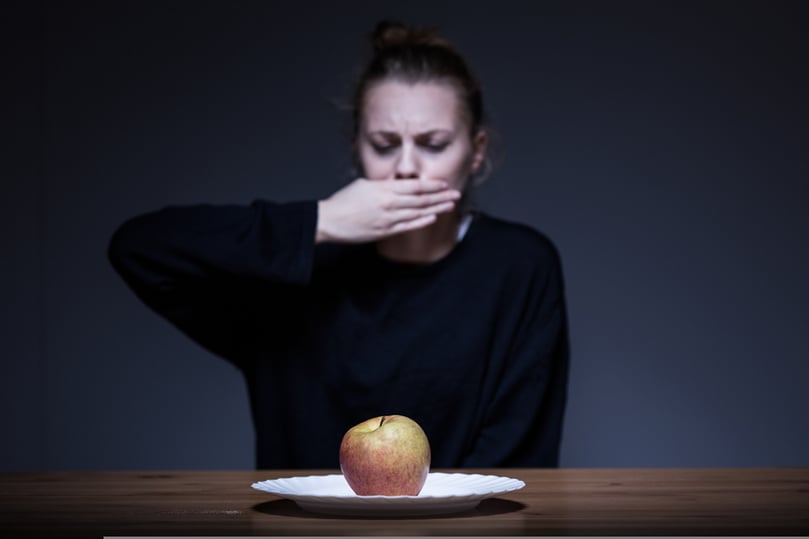Anorexia Nervosa Disorder is a serious illness and should be attended to immediately. Ensuring the safety of our children, friends, and family members is critical. People suffering from Anorexia Nervosa Disorder must feel supported, otherwise, their condition can spiral out of control.

What is Anorexia Nervosa Disorder?
Anorexia Nervosa Disorder is a disease that should not be ignored because it involves great losses. It is a conscious refusal of appetite that carries many reasons.
The severity of Anorexia Nervosa Disorder may arise with direct effects, regardless of age, gender, race, or socioeconomic status. Therefore, the effects appear to be different for each of the aforementioned due to the lack of understanding that the physical and psychological signals develop at later stages.
Examples of Anorexia Nervosa Disorder
For example, two parents come in a state of panic after dealing with their teenage daughter Amy. They wonder what the hidden reason behind the dreadful changes that appeared on her body was.
They couldn't determine the reason behind her rapid weight loss, as she refuses to eat. Amy cannot even look at food because it has become a true enemy for her. It is critical that her mother and father play an active role, with a therapist's help.
Venting and discussing personal situations in a therapeutic environment will lead to better situations and influences that will not spiral out of control. Sometimes wrapped words coming from a teenager may indicate the beginning stages of this disease.
For example, repetitive phrases said by teenagers can include "I can make the decision about what I eat," or "this is the only action that I can control," or "I am stupid and obese." Teenagers with Anorexia Nervosa Disorder often look at themselves in the mirror and utter negative words that should not exist.
For example, teenagers will often say, "I am obese," or "I need laborious exercises to lose weight," or"I am fat, I eat too much, and my body is ugly."
Some teenagers with Anorexia Nervosa Disorder may say, "I want to look like a model" or "I want to feel slim and pretty." The intensity of someone with Anorexia Nervosa Disorder accomplishing more thinness is grave and never-ending, and their views of themselves are still completely different.

Anorexia Nervosa Disorder and a Vegan Plant-Based Diet
Encourage your child to consume fruits and vegetables. How can you do this? This can be accomplished by psychologically convincing them that these types of foods have very low to no fat or calories because it is true.
Children suffering from these types of disorders fear gaining weight, and weight-gain is almost always attributed to unhealthy eating and high-fat foods.
Express to your child that they need to treat their body like a temple, so they get the nourishment and thinness that they are seeking. Healthier eating over time and incorporation of herbal remedies will allow your child to reap the benefits from a vegan and plant-based diet.
What Factors Exist Behind Anorexia Nervosa Disorder?
Moreover, someone suffering from Anorexia Nervosa Disorder has an obsessive preoccupation with the number of calories for food, which may lead to an increased infatuation with the use of laxatives and diuretics. This may cause water loss leading to rapid weight loss, which affects the control of intestinal and urinary tract functions and can lead to menopause.
These health problems are accompanied by psychological problems that may lead to self-harm, increased low self-esteem, anxiety, depression, lack of control over emotions, and excessive sensitivity to people criticizing behaviors. Stubbornness, persistence, and a dominating personality may cause resistance that interferes with their ability to make sound decisions, delaying treatment.
How Can You Help A Child Suffering from Anorexia Nervosa Disorder?
When it comes to the mother and father's role when dealing with a child with Anorexia Nervosa Disorder, there are steps to take. Including a licensed therapist can help their child overcome this debilitating condition. Here are the steps on how to combat Anorexia Nervosa Disorder and accomplish healing:
- Talk to your child about their fears and discuss the situation with them as a conscious adult. Express the harms that are resulting from their condition;
- Make your child trust you, and they will seek help from you when they need it without fear or hesitation;
- Attend all appointments and do not miss them or be lazy about the process because it is very serious. Ask all the right questions that will benefit your child;
- Do not lose your patience with your child because matters involving Anorexia Nervosa Disorder is not that easy. Understand that this process will take time, so be patient, understanding, and supportive of your child's needs in a positive manner; and
- Spend quality time with your child to strengthen the relationship between the two of you more consistently.
Incorporating these nutritional tips will help your child stay healthy when it comes to dealing with Anorexia Nervosa Disorder:
-
Eat fermented foods;
-
Consume smaller and more regular meals;

Eat whole grains and good carbohydrates;
-
Lessen coffee intake and drink more herbal tea;
-
Choose healthier sugars like maple syrup, avoid refined;
-
Limit your alcohol intake;
-
Consume healthy herbs and vitamins such as Vitamin C, Vitamin B Complex, and Vitamin D; and
-
Stay hydrated and drink plenty of liquids (vegetable stock or water).
There are really no excuses not to try these nutritional tips. If you are a man or woman looking for specific health benefits or just want to know about the general healing properties of the products that we recommend on our website. Please remember to comment or post any health questions, or contact us directly!
References
Anorexia Nervosa Is a Modern Obsessive-Compulsive Disorder | Psychology Today


















